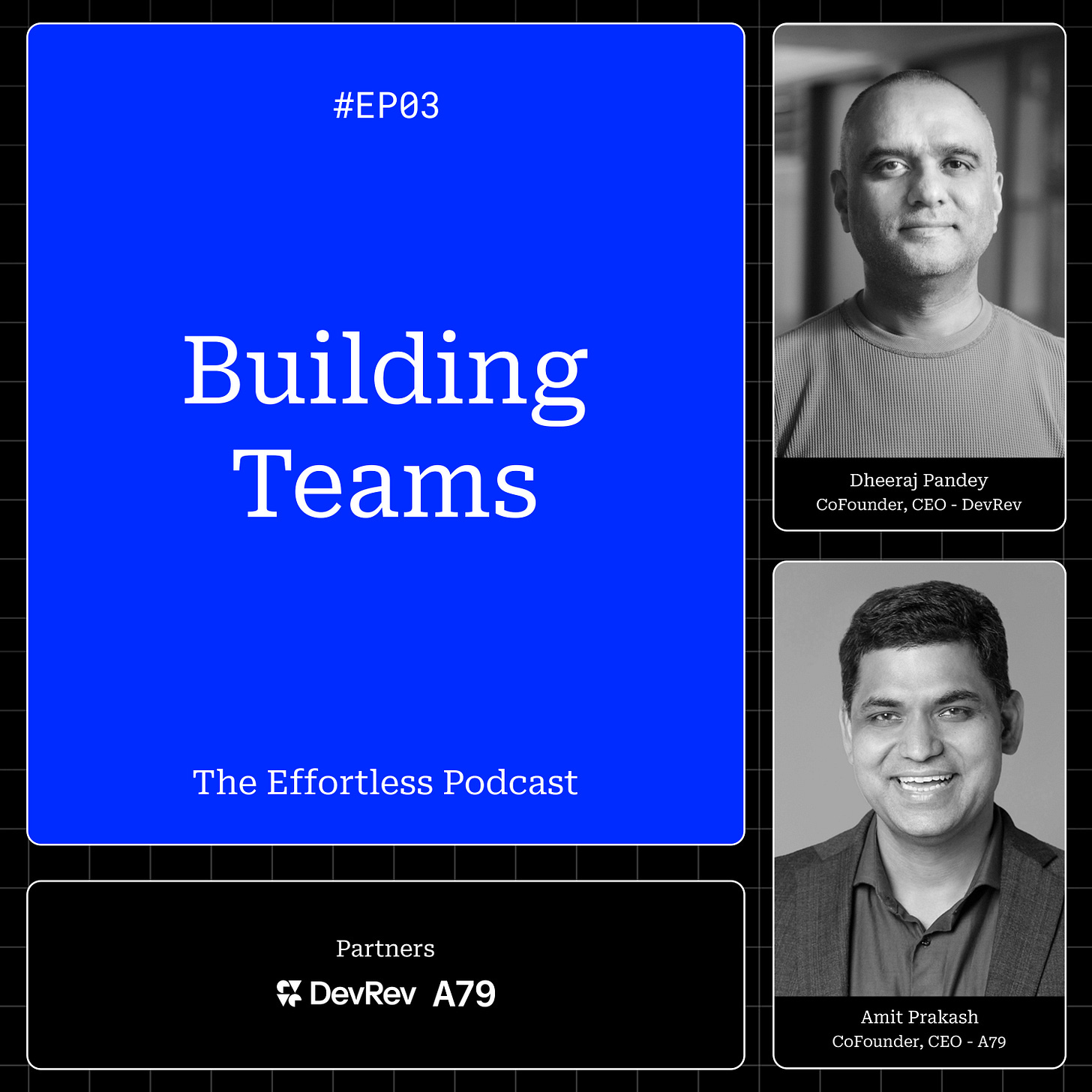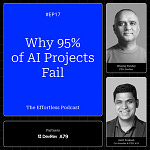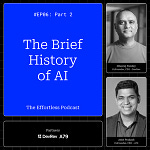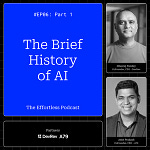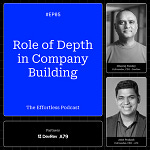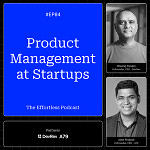Hosts:
Dheeraj Pandey - Co-Founder & CEO of DevRev, former CEO of Nutanix
Amit Prakash - Co-Founder & CTO of ThoughtSpot, former engineer at Google and Microsoft
Summary:
In this episode of The Effortless Podcast, hosts Dheeraj Pandey and Amit Prakash tackle the complex art of building and managing distributed teams in a world where every dollar must be stretched. With economic pressures on startups—like high-interest rates and rising costs in tech hubs—the focus has shifted to sustainable growth, with a big emphasis on global talent and robust platform design. They discuss how to strategically grow and maintain high-performance teams across different geographies, the importance of investing in platform and API extensibility, and the value of distributed design and customer co-creation.
Key Takeaways:
The Long-Term Value of Distributed Teams: Start early on global hiring to build and sustain long-term momentum, focusing on creating clusters that bring unique advantages and perspectives to your business.
Stretching the Dollar via Platform Thinking: A flexible, well-designed platform allows startups to defer granular features and empower customers, internal teams, and external partners to contribute meaningfully.
Arm’s Length Thinking for Sustainable Team Structures: Cultivate a culture of collaboration and structure in distributed teams, balancing autonomy with effective communication and standardized practices.
The Goldilocks Hire: Find a hybrid team leader in new regions with the right balance of product and people management skills to drive early-stage growth and collaboration.
Building Global Culture and Connectivity: Regular in-person events, collaborative workshops, and adopting a writing culture can help bridge cultural and time-zone divides.
Platform Extensibility to Fuel Co-Creation: Invest early in APIs and webhooks, allowing for modular customization that supports flexibility for current and future development.
In-Depth Insights
1. Balancing Context and Culture Across Distributed Teams
Building a distributed team doesn’t just mean setting up a satellite office; it requires careful planning and consistent investment in connecting people and purpose. Dheeraj and Amit discuss the need to create a “cluster” mentality, thinking of remote offices as “distributed systems” rather than isolated outposts. Dheeraj suggests starting with a “Goldilocks hire”—someone who balances product acumen with strong people management skills and can lay the groundwork for a growing team in a new geography.
Strategies for Distributed Team Success:
Early Investment in Context Building: Dheeraj suggests seeding teams early to ensure they have the same cultural and operational understanding as the main office.
Focus on EQ as Well as IQ: While hiring for technical aptitude, find people with long-term career aspirations and commitment to company culture.
Use of Writing Culture: Encouraging written communication across teams to bridge information gaps that would otherwise be covered through informal, in-person conversations.
2. Platform-Centric Development: Stretching the Dollar Efficiently
The episode emphasizes building a flexible platform that can meet diverse needs over time, allowing customers, post-sales engineers, and internal teams to “plug in” rather than depend on a core group to address every requirement.
Platform Extensibility Approach:
Mechanisms Over Policy: Focus on creating versatile mechanisms that can be customized later, rather than building specific features that may become bottlenecks.
Miniaturize Consumption: As Amit and Dheeraj discuss, small, discrete consumption points like APIs allow for gradual customer adoption and faster deployment of new functionality.
Collaboration Through APIs and Webhooks: APIs allow for seamless integration and faster iteration by allowing customers and external developers to create custom solutions.
3. Mindful Scaling with Strategic People Placement
Both hosts underline the importance of deliberate planning when scaling, particularly across borders. Dheeraj shares insights from his experience scaling in lesser-known markets like Slovenia and Argentina, pointing out that patience and a founder’s personal involvement are crucial for finding the right people and establishing local credibility.
Tactical Steps for Global Scaling:
Conviction and Persistence: Founders must lead global expansion and invest time personally to build local networks and find core hires.
Seeding the Right Talent Pools: Identify target markets where talent aligns with long-term needs, ensuring that they also have a solid understanding of equity value and growth.
Leveraging Modern Tools: Post-COVID, services like Employee of Record (EOR) providers have made it easier to manage global employment, removing previous logistical and legal barriers to hiring worldwide.
4. Developing a Culture of Co-Creation and Continuous Discovery
To ensure that development aligns with user needs and market trends, Dheeraj and Amit stress a culture of co-creation through robust discovery. By involving customers in the feature development process and adopting a platform approach, startups can avoid being locked into specific features while delivering incremental value.
Co-Creation Culture Components:
Platform as a Foundation for Collaboration: Build platforms that support user-driven features and configurations, allowing more flexibility for both the team and the customers.
Continuous Discovery: By adopting an iterative approach with customer feedback, companies can maintain agility and adapt to changing demands, which can prevent backlog and feature bloat.
Internal Community Building: Before pushing APIs and webhooks externally, build an internal community of users to fine-tune their usability and effectiveness.
5. From Distributed Teams to Distributed Systems Thinking
The episode draws parallels between distributed teams and distributed computing, advocating for a “clustered” approach where teams have autonomy and context but remain aligned with the broader organization. Teams should avoid “monoculture” thinking, which stifles creativity and diversity and can lead to unbalanced workloads.
Distributed Systems and Team Management:
Autonomy and Locality: Allow for “eventual consistency,” where distributed teams operate with a certain level of independence, but in a way that aligns with core organizational goals.
Eventual Consistency Over Strict Consistency: Recognize that distributed systems—whether in tech or teams—don’t need real-time alignment on every decision, as long as they converge on shared objectives.
Host Biographies
Amit Prakash
Co-founder and CTO at ThoughtSpot, previously at Google and Microsoft. Amit has an extensive background in analytics and machine learning, holding a Ph.D. from UT Austin and a B.Tech from IIT Kanpur.Dheeraj Pandey
Co-Founder and CEO of DevRev, and former CEO of Nutanix. Dheeraj has led multiple tech ventures and is passionate about AI, design, and the future of product-led growth.
Episode Breakdown
{00:00:00} Finding Balanced Talent Early: Dheeraj reflects on the importance of finding balanced talent early to seed distributed teams.
{00:01:00} The Calming Power of Nature: Exploring the cultural benefits of nature in team building.
{00:01:57} Shifting Economic Landscapes: From low interest rates to a focus on sustainable growth.
{00:02:59} Sourcing Global Talent: Amit shares lessons from India and Belarus.
{00:04:00} Retaining Talent in Fast-Growing Economies: Challenges in fostering long-term thinking.
{00:05:00} The Importance of Appreciation: Dheeraj on building a culture of feedback and recognition.
{00:06:35} Overcoming Biases in Global Teams: Creating trust and inclusion across geographies.
{00:08:00} Writing Culture as a Bridge: Clarity, transparency, and accessibility for distributed teams.
{00:10:17} Concentrated Workshops: Fostering connection, mentorship, and rapid iteration.
{00:11:11} Trilogy University’s Bootcamp Model: Lessons on camaraderie and structured onboarding.
{00:13:00} The Intersection of AI and UI: Addressing talent shortages and their symbiosis.
{00:14:53} Early Challenges of Global Expansion: Context transfer and creating self-sufficient teams.
{00:17:29} The Distributed Systems Mindset: Building eventual consistency in team structures.
{00:19:34} Avoiding Monocultures: How distributed teams foster innovation and diversity.
{00:25:47} Building Teams in Slovenia and Argentina: Dheeraj shares insights on equity and long-term commitment.
{00:28:19} The Trifecta Challenge: Balancing design, development, and product management in distributed teams.
{00:33:00} Platform Thinking: The value of building extensibility and deferring rigid features.
{00:36:12} API-First Architectures: Miniaturizing consumption to create flexible ecosystems.
{00:39:00} Lessons from Microsoft and Apple: Building ecosystems through extensibility and APIs.
{00:45:18} Arm’s-Length Thinking: Collaborating with internal and external stakeholders for scalable platforms.
{00:46:55} Closing Takeaways: Amit’s reflections on pipelines, platform extensibility, and global talent strategies.
{00:48:00} Teasing the Next Episode: Extending customization to UI and the evolving role of AI in user interfaces.
References and Resources
Books
Continuous Discovery Habits by Teresa Torres – On iterative product discovery.
The Design of Everyday Things by Don Norman – Essential for understanding design thinking.
Articles
Microsoft’s Evolution with APIs – How early API development created an ecosystem.
Apple's App Store – The rise of extensibility through iOS APIs and ecosystem thinking.
In today’s challenging economic climate, building resilient teams and flexible platforms is essential for startups aiming for long-term success. This episode underscores that creating strong, globally distributed teams and adopting a platform-first approach are critical strategies for stretching resources effectively. By focusing on early investments in team context, fostering co-creation with customers, and building platforms that enable flexible, scalable customization, founders can position their companies to adapt and thrive. Whether it’s finding the right talent, developing a culture of collaboration, or building an extensible product, these practices create a foundation for sustainable growth in a fast-evolving world.


